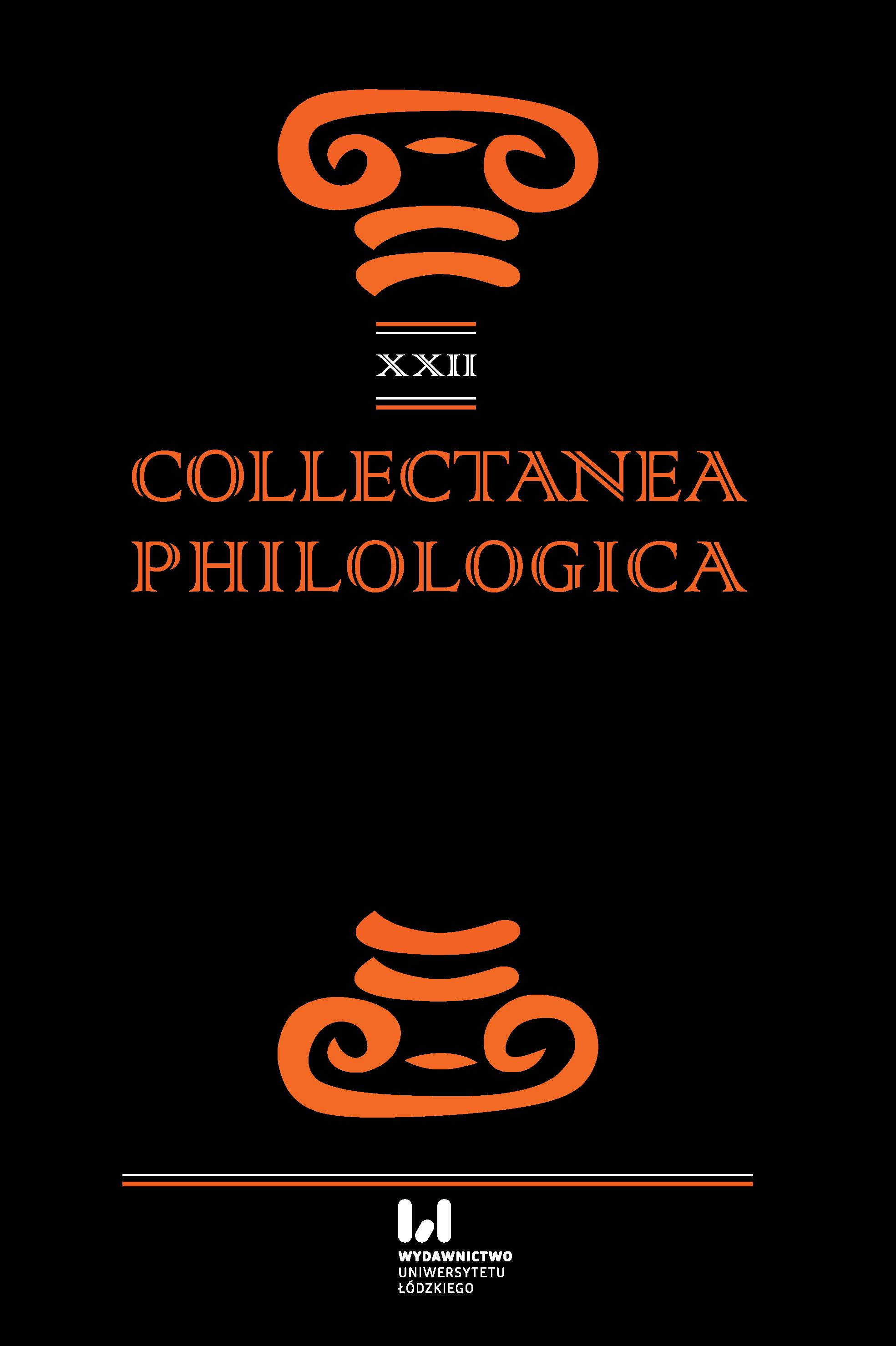Parentalia, Lemuria, Larentalia, Compitalia, Mundus Patet – ceremonie ku czci zmarłych w rzymskim systemie wierzeń
DOI:
https://doi.org/10.18778/1733-0319.22.04Słowa kluczowe:
ancient Roman religion, human sacrifice, Roman religious festivities, Roman religious rites, ancient magicAbstrakt
The ceremonies in honour of the dead – Parentalia, Lemuria, Larentalia, Compitalia, mundus patet – corresponded with the spiritual needs of the Romans. The purpose of the religious event recorded in the fasti usually resulted from its placing at a specific moment of the religious year, which was of great significance to the sacral community. A religious intuition in the Romans gave ground to the combination of official ceremonies in the honour of ancestors with important agricultural dates i.e. defined periods for the evaluation of time and space, which, often, accepted the form of apotropaic festivities with magical rituals. Often, the ceremonies of the turn of the year guaranteed human and animal fecundity as well as vegetative fertility.
Bibliografia
Barber, E.A. (red.) (1960). Sexti Properti Carmina. Oxonii: Oxford University Press.
Google Scholar
Bernadotte Perrin, B. (red.) (1959). Plutarch’s Lives. London: Harvard University Press.
Google Scholar
Cardauns, B. (red.) (1967). M. Terentius Varro, Antiquitates Rerum Divinarum. Wiesbaden: Akademie der Wissenschaften und der Literatur. Mainz Franz Steiner Verlag.
Google Scholar
Carolus Hosius, C. (red.) (1981). Auli Gellii Noctium Atticarum libri XX. Stutgardiae: Teubner.
Google Scholar
Fairclough, H.R. (red.) (1960). Virgil, Aeneid. London: Harvard University Press.
Google Scholar
Fairclough, H.R. (red.) (1960). Virgil, Eclogues. London: Harvard University Press.
Google Scholar
Fisher, C.D. (red.) (1906). Cornelii Taciti Annalium ab Excessu Divi Augusti Libri. Oxford: Clarendon Press.
Google Scholar
Frazer, J.G. (red.) (1959). Ovid’s Fasti. London: Harvard University Press.
Google Scholar
Glover, T.R. (red.) (1977). Tertullian, Apology. De spectaculis. Cambridge, Massachusetts: Harvard University Press.
Google Scholar
Holder, A. (red.) (1894). Pomponius Porphyrio, Commentum in Horati Epistulas, [w:] Pomponi Porfyrionis Commentum in Horatium Flaccum. Ad Aeni Pontem: Sumptibus et Typis Wagneri.
Google Scholar
Hooper, W.D. (red.) (1960). Marcus Terentius Varro, On Agriculture. London: Harvard University Press.
Google Scholar
Jurewicz, O. (red.) (1986). Quinti Horati Flacci Opera Omnia, t. I: Carmina et Epodon librum continens. Wrocław: Ossolineum.
Google Scholar
Kent, R.G. (red.) (1958). Varro, On the Latin Language. London: Harvard University Press.
Google Scholar
Keyes, C.W. (red.) (1969). M. Tullius Cicero, De Legibus. London: Harvard University Press.
Google Scholar
Lindsay, W.M. (red.) (1965). Festus, De verborum significatu. Hildesheim: Georg Olms.
Google Scholar
Lindsay, W.M. (red.) (1965). Paulus Festus, Epitoma Festi, [w:] De verborum significatu. Hildesheim: Georg Olms.
Google Scholar
Luck, G. (red.) (1988). Albii Tibulli Aliorumque Carmina. Stutgardiae: Teubner.
Google Scholar
Martin, J. (red.) (1969). Lucretius T. Carus, De Rerum Natura Libri Sex. Lipsiae: Teubner.
Google Scholar
Mazzarino, A. (red.) (1962). M. Porci Catonis De Agri Cultura. Lipsiae: Teubner.
Google Scholar
Mommsen, T. (red.) (1903). Corpus Inscriptionum Latinarum, Vol. I. Berolini: Apud Georgium Reimerum (editio altera).
Google Scholar
Peter, H., Kroymann, J. (red.) (1967). M. Porcius Cato, Origines, [w:] Historicorum Romanorum Reliquiae, Vol. I. Stutgardiae: Teubner.
Google Scholar
Peter, H., Kroymann, J. (red.) (1967). Valerius Antias, Annales, [w:] Historicorum Romanorum Reliquiae, Vol. I. Stutgardiae: Teubner.
Google Scholar
Seymour Comway, R., Flamstead Walters (red.) (1960). Titi Livii Ab Urbe Condita. Oxonii: Oxford University Press.
Google Scholar
Shackleton Bailey, D.R. (red.) (1965–1968). Cicero’s Letters to Atticus. Cambridge: Cambridge University Press.
Google Scholar
Thilo, G., Hagen, H. (red.) (1961). Servii Grammatici qui feruntur in Vergilii Carmina Commentarii. Hildesheim: Georg Olms.
Google Scholar
Willis, I. (red.) (1963). Ambrosii Theodosii Macrobii Saturnalia. Lipsiae: Teubner.
Google Scholar
Arndt, A. (2015). Tibullus, Elegie miłosne. Kraków: Homini.
Google Scholar
Gołębiowski, S. (1980). Horacy, Dzieła, t. I: Pieśni. Pieśń stuletnia. Warszawa: Ludowa Spółdzielnia Wydawnicza.
Google Scholar
Korus, K. (2004). Plutarch, Żywoty równoległe. Warszawa: Prószyński i S-ka.
Google Scholar
Mikołajczyk, I. (2009). Marek Porcjusz Katon. O gospodarstwie wiejskim. Toruń: Wydawnictwo Naukowe Uniwersytetu Mikołaja Kopernika.
Google Scholar
Myszor, W., Stanula, E. (1970). Tertulian, Wybór pism. Warszawa: Akademia Teologii Katolickiej.
Google Scholar
Wesołowska, E. (2008). Owidiusz, Fasti. Kalendarz poetycki. Wrocław: Ossolineum.
Google Scholar
Żółtowska, I. (1999). Cyceron Marek Tuliusz, O państwie. O prawach. Kęty: Wydawnictwo ANTYK.
Google Scholar
Żurek, G. (1994). Lucretius Titus Carus, O naturze rzeczy. Warszawa: Państwowy Instytut Wydawniczy.
Google Scholar
Abramowiczówna, Z. (red.) (1960). Słownik grecko-polski, t. II. Warszawa: Państwowe Wydawnictwo Naukowe.
Google Scholar
Abramowiczówna, Z. (red.) (1962). Słownik grecko-polski, t. III. Warszawa: Państwowe Wydawnictwo Naukowe.
Google Scholar
Ernout, A., Meillet, A. (1967). Dictionnaire étymologique de la langue latin. Histoire des mots. Paris: Librairie C. Klincksieck.
Google Scholar
Plezia, M. (red.) (1999). Słownik łacińsko-polski, t. IV. Warszawa: Wydawnictwo Naukowe PWN.
Google Scholar
Podbielkowski, Z. (red.) (1989). Słownik roślin użytkowych. Warszawa: Państwowe Wydawnictwo Rolnicze i Leśne.
Google Scholar
Walde, A., Hofmann, J.B. (1938). Lateinisches etymologisches Wörterbuch, t. 1. Heidelberg: Carl Winter Iniversitätsverlag.
Google Scholar
Bailliot, M. (2010). Magie et sortilèges dans l’Antiquité romaine. Paris: Hermann Editeurs.
Google Scholar
Benoist, S. (1999). La Fête à Rome au premier siècle de l’Empire. Recherches sur l’univers festif sous les règnes d’Auguste et des Julio Claudiens. Bruxelles: Latomus.
Google Scholar
Bonniec, le H. (1958). Le culte de Cérès à Rome. Des origines à la fin de la République. Paris: Librairie C. Klincksieck.
Google Scholar
Burkert, W. (2006). Stwarzanie świętości. Ślady biologii we wczesnych wierzeniach religijnych. Przeł. L. Trzciokowski. Kraków: Homini.
Google Scholar
DiLuzio, M. (2016). A place at the Altar. Priestesses in republican Rome. Princeton and Oxford: Princeton University Press.
Google Scholar
Eliade, M. (1993). Traktat o historii religii. Przeł. Jan Wierusz-Kowalski. Łódź: Wydawnictwo Opus.
Google Scholar
Eliade, M. (1997). Historia wierzeń i idei religijnych, t. 1. Przeł. S. Tokarski. Warszawa: Instytut Wydawniczy PAX.
Google Scholar
Février, C. (2009). Supplicare deis. La supplication expiatoire à Rome. Brepols: Brepols Publishers.
Google Scholar
Kaczor, I. (2009). „Rzymska Mater Larum – dwa oblicza bogini”. Classica Wratislaviensia XXIX, 21–29.
Google Scholar
Kuszewska, K. (2017). De verborum significatu jako źródło badań nad obrzędowością sakralną starożytnych Rzymian. Łodź. Rozprawa doktorska.
Google Scholar
Newlands, C.E. (1995). Playing with the time. Ovide and the Fasti. Ithaca, New York: Cornell University Press.
Google Scholar
Porte, D. (1985). L’étiologie religieuse dans les Fastes d’Ovide. Paris: Les Belles Lettres.
Google Scholar
Ray, S. (2017). Sources religieuse romaines. Histoire et documents. Paris: Édition Errance.
Google Scholar
Rüpke, J. (2012). Religion in republican Rome. Rationalization and ritual change. Philadelphia: Penn University of Pensylvania Press.
Google Scholar
Sabbatucci, D. (1988). La religione di Roma antica dal calendario festivo all’ordine cosmico. Milano: Il Saggiatore.
Google Scholar
Scheid, J. (1990). Romulus et ses frères. Paris: École française de Rome.
Google Scholar
Scullard, H.H. (1981). Festivals and Ceremonies of the Roman Republic. London: Thames and Hudson.
Google Scholar
Spaeth, B.S. (1996). The Roman Goddess Ceres. Austin: University Of Texas Press.
Google Scholar
Stankiewicz, L. (2001). Cultes romains associés à des traditions locales: les Feriae compitaliciae, [w:] M. Goliński, S. Rosik (red.), Viae historicae. Księga jubileuszowa dedykowana Profesorowi Lechowi A. Tyszkiewiczowi w siedemdziesiątą rocznicę urodzin. Wrocław: Wydawnictwo Uniwersytetu Wrocławskiego. 425–428.
Google Scholar
Thébert, Y. (1997). Niewolnik, [w:] Andrea Giardina (red.), Człowiek Rzymu. Przeł. P. Bravo. Warszawa: Wydawnictwo Bellona.
Google Scholar
Turcan, R. (1998). Rome et ses dieux. Paris: Hachette Littératures.
Google Scholar
Wagenvoort, H. (1956). Studies in Roman Literature, Culture and Religion. Leiden: E.J. Brill.
Google Scholar
Widengren, G. (2008). Fenomenologia religii. Przeł. J. Białek. Kraków: Nomos.
Google Scholar
Pobrania
Opublikowane
Jak cytować
Numer
Dział
Licencja

Utwór dostępny jest na licencji Creative Commons Uznanie autorstwa – Użycie niekomercyjne – Bez utworów zależnych 4.0 Międzynarodowe.










